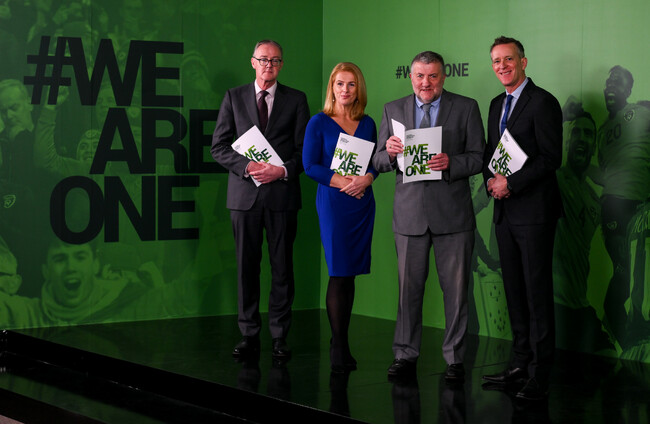LAST UPDATE | 7 Feb 2022
THAT THE MEN’S senior international team qualify for Euro 2024 and that Vera Pauw’s women’s team qualify for either the 2023 World Cup or 2025 Euros are among the medium-term targets set out in the FAI’s latest strategic plan, stretching from this year to 2025.
The strategy document has been put together following consultation with all sections of the game in Ireland, and is described by CEO Jonathan Hill as the “document that will shape the future of Irish football over the next four years and beyond.”
“We are looking to build a new future for Irish football and for the FAI together, an exciting future, we hope”, said Hill. “I ask you now to work together, to come together as never before, to deliver on the promises and targets in the strategy document. We owe that much to the nation and to Irish football.”
The FAI are vowing to create a new, third tier league in the men’s League of Ireland by 2023, and a second tier for the Women’s National League by 2025, all with the ultimate aim of instituting a “transformed football pyramid structure” in Irish football by 2025.
Among the more ambitious targets is that the men’s League of Ireland is ranked among the top 30 leagues in Uefa: it is currently ranked at number 40.
They are also targeting a sold-out men’s FAI Cup final at the Aviva Stadium by 2025, and a sold-out Tallaght Stadium hosting the women’s FAI Cup final by the same year.
Further attendance ambitions include a minimum of 75% attendance at women’s senior international matches, and the FAI are also seeking the peak TV audience on RTÉ to exceed 750,000 for a women’s national team fixture.
The FAI are also targeting a consistent top 30 world ranking for the men’s and women’s senior international teams, and a consistent top 20 ranking for the underage international teams.
There is also a target to secure a primary sponsor for the men’s senior team this year.
Away from the elite of the game, the FAI are aiming to have 300,000 registered players by the end of 2025, with an increase of 50,000 female players and 28,500 male players. Further to that, there is an ambition to have 3,000 registered referees in the system and a 50% retention rate year-on-year of newly-qualified referees.
There are also financial targets: the FAI are aiming for turnover to exceed €50m by end of 2025, with deferred income below €10m and cash reserves of at least €6m. They also aim to grow broadcast/content revenue and commercial revenue by 50% by 2025.
The Association have built their strategy around six key ‘pillars’. They are:
- Transform football facilities and infrastructure
- Drive Grassroots football as the heart of the game
- Nurture Football Pathways for All
- Develop the full potential of football for Women and Girls
- Frame a new future of the League of Ireland
- Build for International Success
As CEO Hill outlined in his presentation, the FAI say these will be achieved by:
- Building a best in class, fit for purpose organisation
- Embracing Digital technologies
- Building a trusted and respected brand
- Driving investment to achieve our Strategy
- Developing a collaborative and inclusive culture
As regards the first of those pillars – improving facilities at League of Ireland stadia and training grounds – Hill said the FAI would work with national and local government along with Uefa to source the necessary funds to do so.
He did add a note of caution: “We are wholly aware of the challenges of sourcing and driving this investment, but we are totally committed to taking our vision to central government and other stakeholders to positively make our case, but we recognise this will be an ongoing project.”
The FAI say they will commit to an audit of facilities around the country this year, in order to develop an Infrastructure Plan for the League of Ireland to be published and implemented next year, at which point the investment will be sought.
On player pathways – and against the backdrop of a fraught and ongoing fall-out between the schoolboy and LOI academy constituencies over the altered start date of the U14 national leagues – Hill again sounded a clarion call for unity.
“We must all work together and forget our past differences and allegiances to enable every player, coach, referee and volunteer regardless of age, ability and gender to reach their full potential and enjoy their football. This will require a lot of open debate, soul-searching and sacrifice in the coming years.
“For our most talented players this is even more significant now as we come to terms with the realities of Brexit.”
The FAI have not entirely ruled out a national academy at Abbottstown, saying it will be kept under review and analysed according to “need and affordability.” There will also be a fresh, refined Player Development Plan, to be delivered later this year and led by the Association’s Director of Football, a role that is currently vacant since Ruud Dokter’s exit at the end of 2020. The FAI are currently advertising for the position.
The entire Strategy document can be read here.












He should never have gone back on yesterday after the blow he took. It was a vicious hit.
@Kevin: honest question Kevin, would you know if a cricket ball is harder than a sliotar? I’ve never held a cricket ball, I know they are both made from leather and both have a cork interior.
@Devilsavocado:
Much harder.
@Kevin: they need to have the new helmets marked down as compulsory. Yesterday perfectly illustrated why once again
@Devilsavocado: harder and heavier I think ..